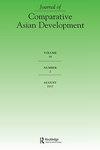The ‘Complementarity Conjecture' — Does Civil Society Engagement Strengthen Input Legitimacy and Shape Policy Delivery? The Case of Gender Mainstreaming in India and Nepal 2005–15
Q3 Social Sciences
引用次数: 6
Abstract
Abstract This study presents critical discourse analysis of gender mainstreaming in India and Nepal. Mainstreaming is a United Nations policy objective subscribed to by 180+ states. It aims to embed gender equality concerns in every stage of the policy process. Complementarity theory emphasizes how politicians attempt to cope with complexity by engaging civil society in policy formulation, thus not only strengthening input legitimacy but also policy efficacy through the pursuit of shared cognitive maps for action. Political elites in both countries have espoused such engagement. However, the findings show that instead of securing the anticipated complementarity effects, the current practice is aligned to an instrumentalist, ‘expert-bureaucratic' policy intervention. This is because of the pronounced power asymmetry between the government and civil society. This manifests itself in marked contrasts in policy framing and issue prioritization. The overall effect is state-driven policy delivery. This undermines the capacity of the civil sphere to challenge the traditionally male-dominated power structures and hampers progress towards the normative vision of gender equality set out in the UN policy.“互补性猜想”——公民社会参与是否能增强投入合法性并影响政策的实施?2005 - 2015年印度和尼泊尔性别主流化案例
摘要本研究对印度和尼泊尔的性别主流化进行批判性话语分析。主流化是联合国180多个国家支持的一项政策目标。它旨在将性别平等问题纳入政策进程的每一个阶段。互补性理论强调政治家如何试图通过让公民社会参与政策制定来应对复杂性,从而不仅通过追求共同的行动认知地图来增强输入合法性,还可以提高政策效力。两国的政治精英都支持这种接触。然而,研究结果表明,目前的做法并没有确保预期的互补性效应,而是与工具主义、“专家-官僚”政策干预相一致。这是因为政府和公民社会之间明显的权力不对称。这表现在政策制定和问题优先次序的显著差异上。总体效果是国家驱动的政策交付。这削弱了民间领域挑战传统上由男性主导的权力结构的能力,阻碍了联合国政策中关于性别平等的规范性愿景取得进展。
本文章由计算机程序翻译,如有差异,请以英文原文为准。
求助全文
约1分钟内获得全文
求助全文
来源期刊

Journal of Comparative Asian Development
Social Sciences-Political Science and International Relations
CiteScore
1.30
自引率
0.00%
发文量
2
期刊介绍:
The Journal of Comparative Asian Development (JCAD) aims to offer the most up-to-date research, analyses, and findings on the many aspects of social, economic, and political development in contemporary Asia conducted by scholars and experts from Asia and around the world.
 求助内容:
求助内容: 应助结果提醒方式:
应助结果提醒方式:


